
Beetroot is something of a superstar supplement: it fights inflammation, reduces oxidative stress, and can even boost your performance in endurance exercise.
For these reasons, beet juice and beetroot supplements are popular among a wide range of fitness and health enthusiasts, and has been hailed as one of the top superfoods out there.
It’s also used as a core ingredient for many pre-workout drinks.
Our research team put together these rankings of the top beetroot supplements right now.
1. Humann BeetElite
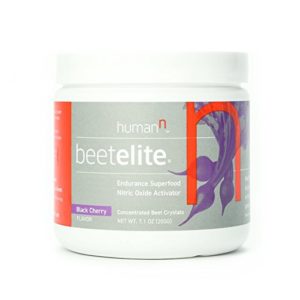
Click here for the lowest price on Amazon
When it comes to beets for increasing athletic performance, BeetElite is the best choice. It’s the brand that is used by dozens of elite athletes and pro teams to increase performance, and it strikes a good balance between purity and usability.
Each serving contains the equivalent of six whole beets, and the powder is flavored with natural black cherry and stevia leaf extract. This eliminates the astringent, unpleasantly tart taste you can get from a pure beetroot juice powder, but it doesn’t introduce anything unnatural, it keeps the carb content low, and it doesn’t go overboard with extra ingredients.
The company also offers a lower-dosage beet supplement called SuperBeets, but BeetElite comes in a higher dose per package.
2. Ora Renewable Energy
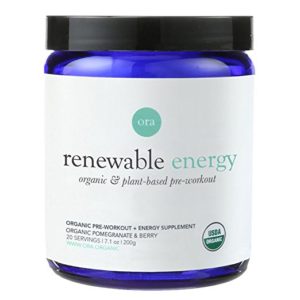
Click here for the lowest price on Amazon
Ora offers something new: a plant-based pre-workout energy supplement. As you might guess, the nitric oxide boosting effects of beetroot powder play a central role in this supplement.
Beetroot is accompanied by supplements like matcha and green coffee bean to boost energy, and coconut water for electrolytes.
If you want a workout supplement that doesn’t include artificial ingredients and flavors, Ora should be your top choice.
3. Beet VO2 Max
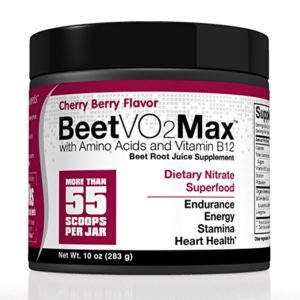
Click here for the lowest price on Amazon
Beet VO2 Max is a strong candidate for people looking to improve their endurance exercise performance with a beetroot powder supplement.
It throws in some electrolytes and amino acids on the side to help repair the damage you do to your muscles during a long endurance effort. These extras simultaneously make it better for athletes and worse for the general population.
If you just want to take beetroot for its health benefits, you don’t need these added ingredients, but these can make a big difference if you are running, cycling, swimming, or doing another endurance sport.
4. Lakewood Organic Pure Beet Juice
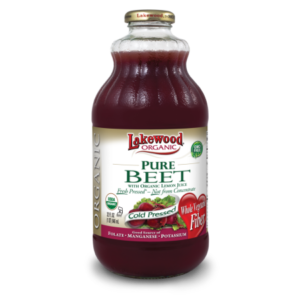
Click here for the lowest price on Amazon
If powderized dried beets aren’t your thing, getting beetroot in juice form might be your best option. You can drink Lakewood Organic’s beetroot juice straight-up, but it also blends well into smoothies and protein shakes. The nutrients and antioxidants aren’t as concentrated in a juice form versus a powder, so you will have to drink more of it.
On the other hand, being able to consume beetroot in a variety of ways is never a bad thing. Another downside is the carbohydrate content–if you are trying to keep your carb intake low, juiced beets is not the way to go.
5. Starwest Botanicals Beetroot Powder
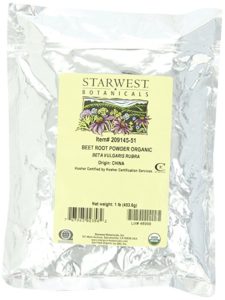
Click here for the lowest price on Amazon
When it comes to bulk beet powder, Starwest Botanicals takes the crown. With a pure, organic product with a well-renowned reputation, Starwest is the best choice if you will be mixing up your own supplements or are looking for a pure beetroot powder to incorporate into a smoothie.
If you want a little something extra in your beetroot supplement, then there are other options out there.
6. VivaDeo Pure Beets
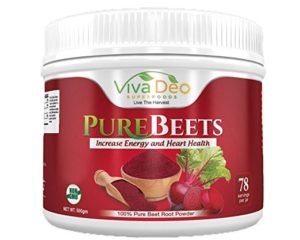
Click here for the lowest price on Amazon
Pure Beets by VivaDeo offers a one hundred percent pure powdered form of beetroot, and it’s organic to boot. The organic source means you can be confident there are no pesticides or herbicides that make it into the supplement, and the lack of other ingredients keeps the calorie count low and the purity high.
It’s clearly geared towards people oriented towards improving their overall health, so there aren’t any ancillary ingredients to boost athletic performance, but sometimes that’s just what you want.
7. BulkSupplements Pure Beet Root Powder
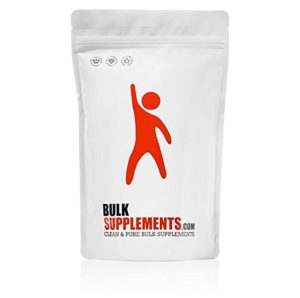
Click here for the lowest price on Amazon
Bulk Supplements comes through again for the rigorously minimal do it yourself-ers. They offer a large, highly pure package of beet root powder with nothing extra added. The downside for this supplement specifically is that you don’t know a whole lot about the source of the beetroot powder. For example, is it organic?
Other powder forms have a leg up on BulkSupplements in this situation for this specific reason. Still, BulkSupplements offers a quality beetroot product that’s hard to call a bad choice. If you want huge volumes of beetroot powder, BulkSupplements is the only way to go–you can get up to five kilograms in one bag!
8. Zhou Nutrition N.O. Pro
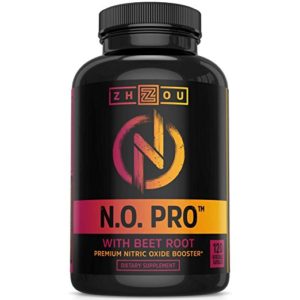
Click here for the lowest price on Amazon
Zhou Nutrition makes one of the few beetroot based supplements that comes in capsule form. It includes a blend of amino acids alongside the beetroot powder; these are supposed to further augment the nitric acid boosting properties of the supplement.
The downside of the pill based form is you have to take a lot of them to get even a small dose of beetroot powder. Most people should opt for a powder based beetroot supplement so they can get a higher dosage of beets.
9. BPI Sports Health Green Tea Beetroot Fiber MCTs
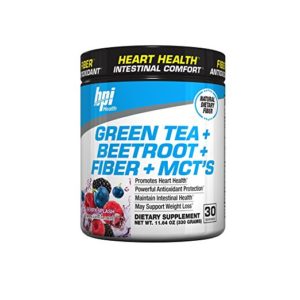
Click here for the lowest price on Amazon
If the name doesn’t give it away, one look at the ingredients list should reveal that this supplement is something of a hodgepodge of different supplement ingredients that are currently popular, and they don’t all necessarily go together.
Combining green tea extract and beetroot powder is a reasonable idea, since both may improve exercise performance, but adding fiber and MCTs to that mix doesn’t make sense if the purpose is increasing performance.
10. Premium Miracle Beets
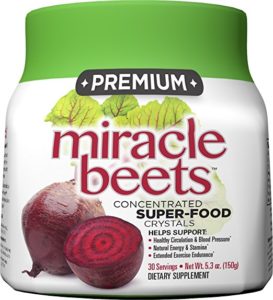
Click here for the lowest price on Amazon
Premium Miracle Beets is reasonably popular, but doesn’t back this popularity up with transparency. Its ingredients are locked up in a “proprietary blend”–yes, it contains beetroot powder, but it also contains grape seed extract, blueberry powder, cranberry powder, and nearly a dozen other ingredients.
The problem with the proprietary blend is that you can’t tell how much of each ingredient is included. With beetroot powder especially, you want to be able to measure your dosage out so you know you are getting the optimal amount. With a supplement like this, that’s not possible.
Beetroot benefits and side effects
Scientifically called “beta vulgaris”, beetroot is a highly nutritious root vegetable, which is also taken as a supplement.
This superfood is full of essential nutrients like fiber, vitamin B9 (folate), iron, manganese, vitamin C, and potassium.
It also rich in various plant compounds, such as inorganic nitrate, betanin and vulgaxanthin (1).
Both raw beetroot and its juice offer plenty of health benefits. This article will discuss all the health benefits of beetroot intake along with recommended dosage and possible side effects in detail.
Benefits
Hypertension is a health condition in which blood pressure goes abnormally high which damages the heart and also the blood vessels. This condition has been identified as the biggest risk factor for cardiac diseases, stroke, and even premature death across the globe (2).
In this condition, high blood pressure leads to the thickening of the heart muscle which then needs a greater force for pumping blood. This action further injures the arteries and makes them stiffer. The stiffer the heart, the longer it takes to relax.
However, regular intake of beetroot juice can significantly reduce elevated levels of blood pressure. According to research studies conducted on nitric oxide and hypertension in the years 2014 and 2015 (3, 4), people with high blood pressure can lower their blood pressure by consuming a diet that is rich in inorganic nitrates (found in abundance in beetroot juice).
Beetroot is rich in inorganic nitrate content which converts into nitric oxide in the body. Nitric oxide is a biological messenger that passes through the arteries and sends signals to the muscle cells (present around the artery walls) to relax. When the muscle cells in the arteries relax, the blood vessels dilate, resulting in lower blood pressure.
A study conducted by a team of researchers in 2008 showed that the intake of beetroot juice can lower blood pressure level by nearly 3 to 10mm/Hg in a few hours (5). Furthermore, researchers have confirmed that on a public health level such a reduction can equate to nearly 10 percent reduction in the number of deaths that occur due to cardiovascular diseases.
Also, if people with high blood pressure continue to drink beetroot juice on a daily basis, researchers say that it can have an even greater effect on their health.
Dietary nitrate found in beetroot juice offers cardiac benefits. This can be backed by a study ‘Heart & Circulatory Physiology’ that was published in the American Journal of Physiology. The research specifically focused on beetroot juice which is rich in dietary nitrate content and found out how it impacts patients suffering from cardiovascular diseases (6).
The research found that dietary nitrate content found in beetroot juice helped lower overstimulation of patient’s sympathetic nervous system in patients suffering from cardiac diseases. This further helped in keeping heart rate as well as blood pressure normal.
Drinking beetroot juice regularly can help slow down the progression of dementia. A study conducted by researchers at the Wake Forest University found out that beetroot juice helped improve oxygenation in the brain, which slowed down the progression of dementia. Blood flow to different parts of the brain lowers with age which leads to cognitive decline and increases the chances of dementia. However, chances of developing this condition can be lowered through regular beetroot juice consumption.
Consumption of beetroot and beetroot juice can improve athletic performance and exercise duration primarily because of dietary nitrate found in high concentration in this supplement. Studies show that increased levels of plasma nitrate can improve exercise tolerance, especially when athletes engage in long hours of endurance exercise and training.
Nitrates are known to reduce oxygen use when the body engages in physical activities by affecting mitochondria’s efficiency. Mitochondria are the cell organelles that are responsible for energy production through respiration (7).
Since beetroot improves the body’s oxygen use, it can also help increase stamina and result in better endurance exercise performance. This can be supported by a research study ‘the Effects of Dietary Nitrate on Oxygen Cost during Exercise’ (8). It was found that the juice extracted from beetroot improved athletic performance by nearly 2.8% or about 11 seconds during a 4 kilometer bicycle time-trail, and around 45 seconds in a time trail of 16.1 kilometer.
Rich in fiber content, beetroot is also helpful in keeping the digestive tract healthy. The fiber present in beetroot prevents constipation.
The numerous nutrients, antioxidants, minerals and vitamins found in beetroot such as folate, bioflavonoids, iron, Vitamin A, B and C and potassium keep the body healthy by fighting against diseases and preventing cell damage.
Side Effects
Beetroot is mostly well-tolerated by individuals. However, excessive use and consumption of beetroot can also have side effects on the body. For example, oxalate is found in high levels in beetroot that is known to form kidney stones (9) Besides this, beetroot also contains FODMAPS. These are found in fructose form that are short-chain carbohydrates that help feed the bacteria in the gut. In individuals with irritable bowel syndrome, it can upset the digestive system. Also, people who have hemochromatosis, which is an iron over load disease, should also avoid excessive beetroot consumption as it is rich in iron content.
Recommended dosage
The dose of beetroot is determined on the basis of its nitrate content. Usually, the nitrate target is around 0.1 to 0.2mmol/kg. It is nearly about 436 mg for a person who weighs 150 pounds.
Beetroot can be baked or eaten raw. In addition, it can also be consumed in the form of a smoothie or a puree.
Recap
Beetroot is a highly nutritious root vegetable that can lower blood pressure, improves cardiac health, fights diseases and prevent cell damage.
It also helps slow down the progression of dementia in seniors. However, excessive consumption of beetroot can result in kidney stones and disrupt the digestive system of those that suffer from irritable bowel syndrome.
https://bodynutrition.org/beets/
No comments:
Post a Comment